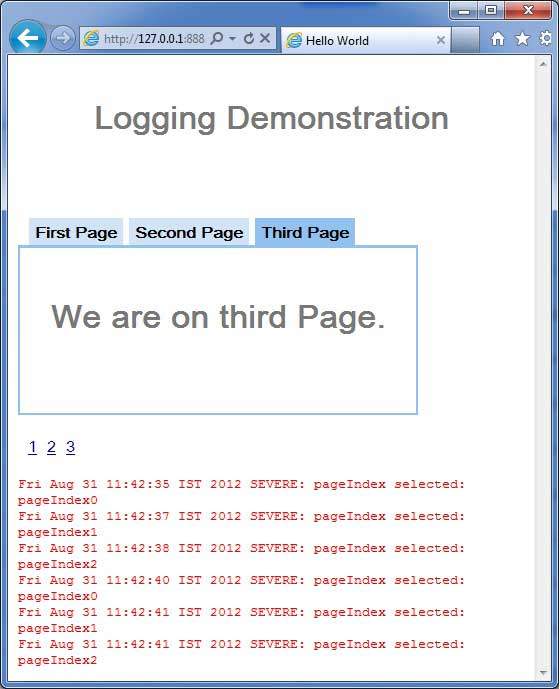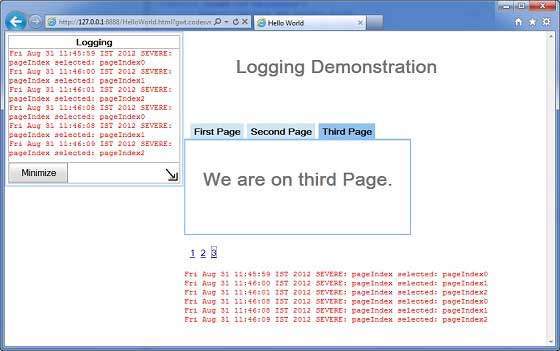GWT - กรอบการบันทึก
เฟรมเวิร์กการบันทึกเลียนแบบ java.util.logging ดังนั้นจึงใช้ไวยากรณ์เดียวกันและมีลักษณะการทำงานเหมือนกับรหัสการบันทึกฝั่งเซิร์ฟเวอร์
การบันทึก GWT กำหนดค่าโดยใช้ไฟล์. gwt.xml
เราสามารถกำหนดค่าการบันทึกให้เปิด / ปิดได้ เราสามารถเปิด / ปิดการใช้งานเครื่องจัดการเฉพาะและเปลี่ยนระดับการบันทึกเริ่มต้น
ประเภทของ Logger
คนตัดไม้จัดอยู่ในโครงสร้างแบบต้นไม้โดยมี Root Logger อยู่ที่รากของต้นไม้
ชื่อของคนตัดไม้กำหนดความสัมพันธ์แม่ / ลูกโดยใช้ . เพื่อแยกส่วนของชื่อ
ตัวอย่างเช่นถ้าเรามีคนตัดไม้สองคน Hospital.room1 และ Hospital.room2 พวกเขาเป็นพี่น้องกันโดยมีพ่อแม่เป็นคนตัดไม้ชื่อ Hospital คนตัดไม้ในโรงพยาบาล (และคนตัดไม้ที่มีชื่อซึ่งไม่มีจุด ".") มี Root Logger เป็นพาเรนต์
private static Logger room1Logger = Logger.getLogger("Hospital.room1");
private static Logger room2Logger = Logger.getLogger("Hospital.room2");
private static Logger hospitalLogger = Logger.getLogger("Hospital");
private static Logger rootLogger = Logger.getLogger("");เครื่องจัดการบันทึก
GWT มีเครื่องจัดการเริ่มต้นซึ่งจะแสดงรายการบันทึกที่สร้างขึ้นโดยใช้เครื่องบันทึก
| ตัวจัดการ | เข้าสู่ระบบ | คำอธิบาย |
|---|---|---|
| SystemLogHandler | stdout | ข้อความเหล่านี้สามารถเห็นได้เฉพาะในโหมดการพัฒนาในหน้าต่าง DevMode |
| DevelopmentModeLogHandler | หน้าต่าง DevMode | บันทึกโดยเรียกเมธอด GWT.log ข้อความเหล่านี้สามารถเห็นได้เฉพาะในโหมดการพัฒนาในหน้าต่าง DevMode |
| ConsoleLogHandler | คอนโซล javascript | บันทึกไปยังคอนโซล javascript ซึ่งใช้โดย Firebug Lite (สำหรับ IE), Safari และ Chrome |
| FirebugLogHandler | Firebug | บันทึกไปที่คอนโซล firebug |
| PopupLogHandler | ป๊อปอัพ | บันทึกไปยังป๊อปอัปซึ่งอยู่ที่มุมซ้ายบนของแอปพลิเคชันเมื่อเปิดใช้งานตัวจัดการนี้ |
| SimpleRemoteLogHandler | เซิร์ฟเวอร์ | ตัวจัดการนี้จะส่งข้อความบันทึกไปยังเซิร์ฟเวอร์ซึ่งจะถูกบันทึกโดยใช้กลไกการบันทึกฝั่งเซิร์ฟเวอร์ |
กำหนดค่าการบันทึกในแอปพลิเคชัน GWT
ไฟล์ HelloWorld.gwt.xml จะถูกกำหนดค่าให้เปิดใช้งานการบันทึก GWT ดังนี้ -
# add logging module
<inherits name = "com.google.gwt.logging.Logging"/>
# To change the default logLevel
<set-property name = "gwt.logging.logLevel" value = "SEVERE"/>
# To enable logging
<set-property name = "gwt.logging.enabled" value = "TRUE"/>
# To disable a popup Handler
<set-property name = "gwt.logging.popupHandler" value = "DISABLED" />ใช้คนตัดไม้เพื่อบันทึกการกระทำของผู้ใช้
/* Create Root Logger */
private static Logger rootLogger = Logger.getLogger("");
...
rootLogger.log(Level.SEVERE, "pageIndex selected: " + event.getValue());
...ตัวอย่าง Logging Framework
ตัวอย่างนี้จะนำคุณผ่านขั้นตอนง่ายๆในการสาธิตความสามารถในการบันทึกของแอปพลิเคชัน GWT ทำตามขั้นตอนต่อไปนี้เพื่ออัปเดตแอปพลิเคชัน GWT ที่เราสร้างในGWT - สร้างบทแอปพลิเคชัน -
| ขั้นตอน | คำอธิบาย |
|---|---|
| 1 | สร้างโครงการที่มีชื่อHelloWorldภายใต้แพคเกจcom.tutorialspointตามที่อธิบายไว้ในGWT - สร้างแอพลิเคชันบท |
| 2 | แก้ไขHelloWorld.gwt.xml , HelloWorld.css , HelloWorld.htmlและHelloWorld.javaตามที่อธิบายด้านล่าง เก็บไฟล์ที่เหลือไว้ไม่เปลี่ยนแปลง |
| 3 | คอมไพล์และเรียกใช้แอปพลิเคชันเพื่อตรวจสอบผลลัพธ์ของตรรกะที่ใช้งาน |
ต่อไปนี้เป็นเนื้อหาของตัวอธิบายโมดูลที่แก้ไข src/com.tutorialspoint/HelloWorld.gwt.xml.
<?xml version = "1.0" encoding = "UTF-8"?>
<module rename-to = 'helloworld'>
<!-- Inherit the core Web Toolkit stuff. -->
<inherits name = 'com.google.gwt.user.User'/>
<!-- Inherit the default GWT style sheet. -->
<inherits name = 'com.google.gwt.user.theme.clean.Clean'/>
<inherits name = "com.google.gwt.logging.Logging"/>
<!-- Specify the app entry point class. -->
<entry-point class = 'com.tutorialspoint.client.HelloWorld'/>
<!-- Specify the paths for translatable code -->
<source path = 'client'/>
<source path = 'shared'/>
<set-property name = "gwt.logging.logLevel" value="SEVERE"/>
<set-property name = "gwt.logging.enabled" value = "TRUE"/>
<set-property name = "gwt.logging.popupHandler" value= "DISABLED" />
</module>ต่อไปนี้เป็นเนื้อหาของไฟล์ Style Sheet ที่แก้ไข war/HelloWorld.css.
body {
text-align: center;
font-family: verdana, sans-serif;
}
h1 {
font-size: 2em;
font-weight: bold;
color: #777777;
margin: 40px 0px 70px;
text-align: center;
}ต่อไปนี้เป็นเนื้อหาของไฟล์โฮสต์ HTML ที่แก้ไข war/HelloWorld.html
<html>
<head>
<title>Hello World</title>
<link rel = "stylesheet" href = "HelloWorld.css"/>
<script language = "javascript" src = "helloworld/helloworld.nocache.js">
</script>
</head>
<body>
<iframe src = "javascript:''"id = "__gwt_historyFrame"
style = "width:0;height:0;border:0"></iframe>
<h1> Logging Demonstration</h1>
<div id = "gwtContainer"></div>
</body>
</html>ให้เรามีเนื้อหาต่อไปนี้ของไฟล์ Java src/com.tutorialspoint/HelloWorld.java ซึ่งเราจะสาธิตการทำบุ๊กมาร์กในรหัส GWT
package com.tutorialspoint.client;
import java.util.logging.Level;
import java.util.logging.Logger;
import com.google.gwt.core.client.EntryPoint;
import com.google.gwt.event.logical.shared.ValueChangeEvent;
import com.google.gwt.event.logical.shared.ValueChangeHandler;
import com.google.gwt.logging.client.HasWidgetsLogHandler;
import com.google.gwt.user.client.History;
import com.google.gwt.user.client.ui.HTML;
import com.google.gwt.user.client.ui.HorizontalPanel;
import com.google.gwt.user.client.ui.Hyperlink;
import com.google.gwt.user.client.ui.RootPanel;
import com.google.gwt.user.client.ui.TabPanel;
import com.google.gwt.user.client.ui.VerticalPanel;
public class HelloWorld implements EntryPoint {
private TabPanel tabPanel;
/* Create Root Logger */
private static Logger rootLogger = Logger.getLogger("");
private VerticalPanel customLogArea;
private void selectTab(String historyToken){
/* parse the history token */
try {
if (historyToken.substring(0, 9).equals("pageIndex")) {
String tabIndexToken = historyToken.substring(9, 10);
int tabIndex = Integer.parseInt(tabIndexToken);
/* Select the specified tab panel */
tabPanel.selectTab(tabIndex);
} else {
tabPanel.selectTab(0);
}
} catch (IndexOutOfBoundsException e) {
tabPanel.selectTab(0);
}
}
/**
* This is the entry point method.
*/
public void onModuleLoad() {
/* create a tab panel to carry multiple pages */
tabPanel = new TabPanel();
/* create pages */
HTML firstPage = new HTML("<h1>We are on first Page.</h1>");
HTML secondPage = new HTML("<h1>We are on second Page.</h1>");
HTML thirdPage = new HTML("<h1>We are on third Page.</h1>");
String firstPageTitle = "First Page";
String secondPageTitle = "Second Page";
String thirdPageTitle = "Third Page";
Hyperlink firstPageLink = new Hyperlink("1", "pageIndex0");
Hyperlink secondPageLink = new Hyperlink("2", "pageIndex1");
Hyperlink thirdPageLink = new Hyperlink("3", "pageIndex2");
HorizontalPanel linksHPanel = new HorizontalPanel();
linksHPanel.setSpacing(10);
linksHPanel.add(firstPageLink);
linksHPanel.add(secondPageLink);
linksHPanel.add(thirdPageLink);
/* If the application starts with no history token,
redirect to a pageIndex0 */
String initToken = History.getToken();
if (initToken.length() == 0) {
History.newItem("pageIndex0");
initToken = "pageIndex0";
}
tabPanel.setWidth("400");
/* add pages to tabPanel*/
tabPanel.add(firstPage, firstPageTitle);
tabPanel.add(secondPage,secondPageTitle);
tabPanel.add(thirdPage, thirdPageTitle);
/* add value change handler to History
* this method will be called, when browser's Back button
* or Forward button are clicked.
* and URL of application changes.
* */
History.addValueChangeHandler(new ValueChangeHandler<String>() {
@Override
public void onValueChange(ValueChangeEvent<String> event) {
selectTab(event.getValue());
rootLogger.log(Level.SEVERE, "pageIndex selected: "
+ event.getValue());
}
});
selectTab(initToken);
VerticalPanel vPanel = new VerticalPanel();
vPanel.setSpacing(10);
vPanel.add(tabPanel);
vPanel.add(linksHPanel);
customLogArea = new VerticalPanel();
vPanel.add(customLogArea);
/* an example of using own custom logging area. */
rootLogger.addHandler(new HasWidgetsLogHandler(customLogArea));
/* add controls to RootPanel */
RootPanel.get().add(vPanel);
}
}เมื่อคุณพร้อมกับการเปลี่ยนแปลงทั้งหมดแล้วให้เรารวบรวมและเรียกใช้แอปพลิเคชันในโหมดการพัฒนาเหมือนที่เราทำในGWT - สร้างบทแอปพลิเคชัน หากทุกอย่างเรียบร้อยกับแอปพลิเคชันของคุณสิ่งนี้จะให้ผลลัพธ์ดังต่อไปนี้ -

ตอนนี้คลิกที่ 1, 2 หรือ 3 คุณสามารถสังเกตได้เมื่อคุณคลิกที่ 1,2 หรือ 3 คุณจะเห็นบันทึกกำลังพิมพ์แสดง pageIndex ตรวจสอบเอาต์พุตคอนโซลใน Eclipse คุณสามารถเห็นบันทึกกำลังพิมพ์ในคอนโซล Eclipse เช่นกัน
Fri Aug 31 11:42:35 IST 2012
SEVERE: pageIndex selected: pageIndex0
Fri Aug 31 11:42:37 IST 2012
SEVERE: pageIndex selected: pageIndex1
Fri Aug 31 11:42:38 IST 2012
SEVERE: pageIndex selected: pageIndex2
Fri Aug 31 11:42:40 IST 2012
SEVERE: pageIndex selected: pageIndex0
Fri Aug 31 11:42:41 IST 2012
SEVERE: pageIndex selected: pageIndex1
Fri Aug 31 11:42:41 IST 2012
SEVERE: pageIndex selected: pageIndex2ตอนนี้อัปเดตตัวอธิบายโมดูล src/com.tutorialspoint/HelloWorld.gwt.xml เพื่อเปิดใช้งาน popupHandler
<?xml version = "1.0" encoding = "UTF-8"?>
<module rename-to = 'helloworld'>
<!-- Inherit the core Web Toolkit stuff. -->
<inherits name = 'com.google.gwt.user.User'/>
<!-- Inherit the default GWT style sheet. -->
<inherits name = 'com.google.gwt.user.theme.clean.Clean'/>
<inherits name = "com.google.gwt.logging.Logging"/>
<!-- Specify the app entry point class. -->
<entry-point class = 'com.tutorialspoint.client.HelloWorld'/>
<!-- Specify the paths for translatable code -->
<source path = 'client'/>
<source path = 'shared'/>
<set-property name = "gwt.logging.logLevel" value = "SEVERE"/>
<set-property name = "gwt.logging.enabled" value = "TRUE"/>
<set-property name="gwt.logging.popupHandler" value = "ENABLED" />
</module>เมื่อคุณพร้อมสำหรับการเปลี่ยนแปลงทั้งหมดแล้วให้โหลดแอปพลิเคชันใหม่โดยรีเฟรชหน้าต่างเบราว์เซอร์ (กด F5 / ปุ่มโหลดซ้ำของเบราว์เซอร์) สังเกตเห็นหน้าต่างป๊อปอัปปรากฏขึ้นที่มุมซ้ายบนของแอปพลิเคชัน
ตอนนี้คลิกที่ 1, 2 หรือ 3 คุณจะสังเกตได้ว่าเมื่อคุณคลิกที่ 1,2 หรือ 3 คุณจะเห็นบันทึกกำลังพิมพ์โดยแสดง pageIndex ในหน้าต่างป๊อปอัป
